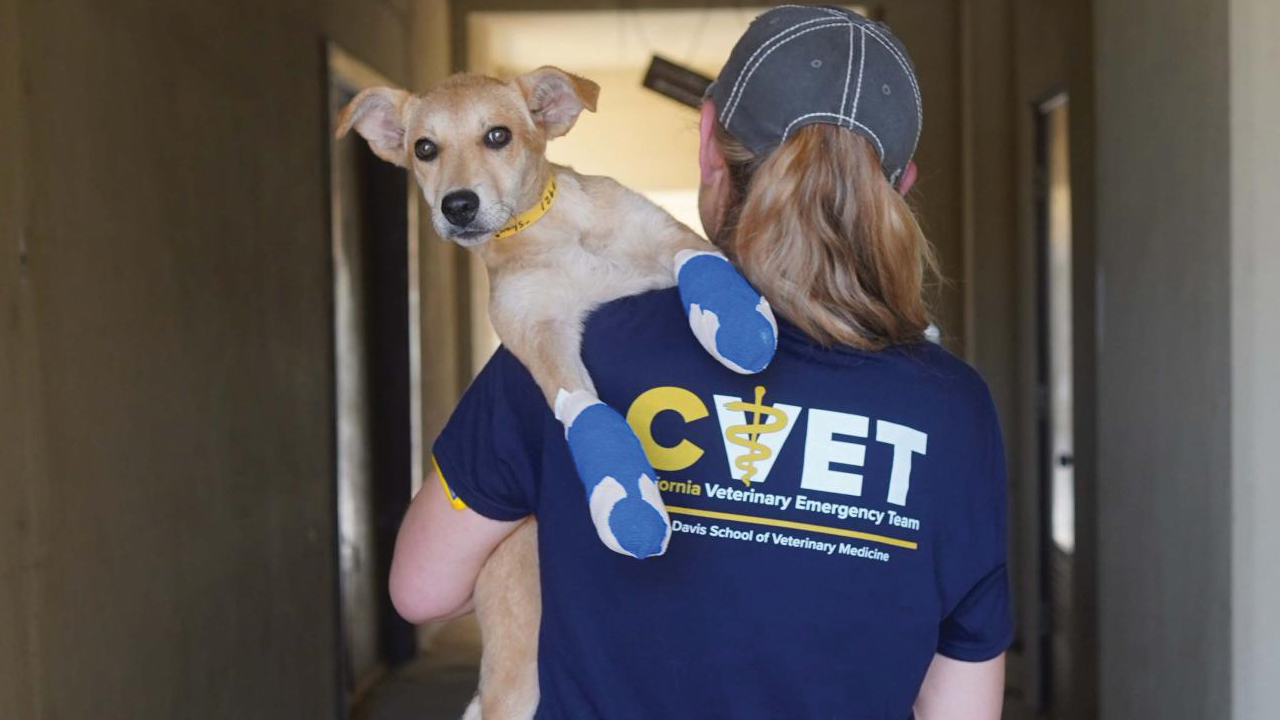
News Bites

Second Chances (Go Zabi!)
Zabi was found with fourth degree chemical burns and received live-saving care from the incredible hospital team after Dr. Karen Vernau from the Orphan Kitten Project (OKP) answered a plea for help from Wonky Hearts Animal Haven, a nonprofit rescue based in Southern California that focuses on special needs. Zabi was brought to UC Davis where he was examined and stabilized. Despite his severe injuries, Zabi showed a desire to fight for his life. He received extensive care, including graft procedures to cover the wounds on his head. Veterinary students with OKP fostered Zabi after his surgeries and helped him while his wounds healed and he made an amazing recovery. Zabi continues his rehabilitation with Wonky Hearts rescue. We wish him the best! Watch Zabi’s story on Instagram.

Answering the Call for Help
The school’s California Veterinary Emergency Team (CVET) responded to the Park Fire, which ignited on June 24 in Butte County. CVET is on call for disaster response 24/7 and trained volunteers are dispatched as veterinary responders. They answered the call when the Park Fire—the largest wildfire of California's 2024 wildfire season, and the fourth largest in state history—exploded in size, forcing hundreds to evacuate along with their animals. More than 50 volunteers logged nearly 2,000 hours helping 86 animals at large and small animal shelters, mostly with burn treatment, bandage care, and bandage removal. Learn more about CVET.

Equinox on the Mend
Equinox, the youngest peregrine falcon to hatch from UC Berkeley’s Campanile this year, found himself in trouble shortly after fledging. He was discovered in the bottom of a boat at the Berkeley Marina with an injured wing. Bay Raptor Rescue retrieved him and transported the bird to WildCare in San Rafael who transferred him on July 5 to the UC Davis California Raptor Center (CRC).
The team with the Companion Exotic Animal Medicine and Surgery Service at the UC Davis veterinary hospital repaired his broken right wing using pins and an external lightweight titanium fixator to stabilize a broken bone. “Nox” recovered at the CRC and was recently placed with Dr. Bill Ferrier, a falconer and previous CRC director, to build flight strength. The UC Santa Cruz Predatory Bird Research Group plans to fit Nox with a satellite transmitter and federal leg bands shortly before release to track his movements and recovery.
“He’s a feisty little guy, which is a great sign, but also challenging for a bird in confinement during recovery,” said Dr. Michelle Hawkins, CRC director. “This has been a huge team effort working to get this bird back out to the wild successfully.”
***
We are deeply saddened to share that after the original printing of this story, Nox passed away on October 23. For more information, visit the California Raptor Center on Instagram. Forever in our hearts, Nox.

UC Davis Expands Veterinary Services
UC Davis purchased a building in San Diego to expand its veterinary services in Southern California, with the new center slated to open in spring 2026. It will be known as the Janice K. Hobbs UC Davis Veterinary Medical Center Southern California. The center’s namesake, Jan Hobbs, is a Southern California philanthropist, animal lover, and UC Davis donor who helped make the building purchase possible.
The new center will greatly expand the school’s veterinary care in Southern California. Once renovated, it will provide 24/7 veterinary emergency and critical care, and will expand its veterinary specialty services to include cardiology, clinical pharmacy, hemodialysis, nephrology and advanced urology, internal medicine, oncology, surgery, and radiology/diagnostic imaging. It is one of the few locations in the country that offers hemodialysis for treatment of kidney failure and advanced therapies for toxicities and immune-mediated diseases.
While the hospital will focus on providing life-changing treatment for cats, dogs, and other beloved companion animals, it will also support UC Davis experts in providing field medicine to wildlife and exotics—for example, animals being cared for by the San Diego Zoo Wildlife Alliance. It will also support local veterinarians to foster greater regional capacity in specialty animal care. Read more about the Hobbs Center here.

Avian Flu Continues Spread
Highly pathogenic avian influenza has been detected on commercial farms in California and other parts of the United States. The most recent outbreak of the highly transmissible strain of bird flu began in early 2022 and has resulted in the deaths of millions of chickens and turkeys. It has recently been detected in California dairy farms by the school's California Animal Health and Food Safety Laboratory, in marine mammals in South America, and other species globally. The CDC has confirmed a handful of human cases in the U.S. and several cases of avian flu in cats on dairy farms.
Several UC Davis veterinarians are actively researching the subject, and the experts are being featured in media throughout the world. The school has a webpage dedicated to updates on this outbreak as it evolves. Follow avian flu updates online.
